|
|
|
Sort Order |
|
|
|
Items / Page
|
|
|
|
|
|
|
| Srl | Item |
| 1 |
ID:
138297
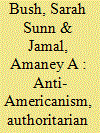

|
|
|
|
|
| Summary/Abstract |
A pillar of American foreign policy in the Middle East since September 11, 2001, has been promoting democracy, with particular emphasis on support for women's representation. Given high levels of anti-Americanism in the region, does foreign pressure for policy reform undermine this project? Evidence from a nationally representative survey experiment in Jordan shows that an American endorsement of women in politics has no average effect on popular support for women's representation. Instead, domestic patterns of support and opposition to autocrats determine citizens' receptivity to policy endorsements, with policy endorsements of foreign-supported reforms polarizing public opinion. Both foreign and domestic endorsements of women in politics depress support among Jordanians who oppose their regime significantly more than among Jordanians who support it.
|
|
|
|
|
|
|
|
|
|
|
|
|
|
|
|
| 2 |
ID:
188390
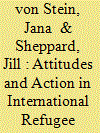

|
|
|
|
|
| Summary/Abstract |
Do citizens care whether their government breaches international law, or are other imperatives more influential? We consider this question in the human rights arena, asking whether and how it matters how abuses are framed. In a novel survey experiment, we ask Australians about their attitudes toward restrictive immigration policy, holding the underlying breaches constant but varying how they are framed. We find that people most strongly oppose policy that violates international law. Emphasizing moral considerations has smaller but still notable impacts on attitudes, whereas reputational frames have the weakest effects. We also find that translating attitudes into political action is challenging: most who learn of current policy's legal, moral, or reputational dimensions and in turn become more critical do not subsequently express greater interest in trying to do something about it. Nonetheless, there are interesting differences across frames. Appealing to international law or moral considerations is more effective at spurring mobilization than emphasizing reputational harm, though via different mechanisms. Framing this debate in international reputational terms consistently has the weakest impacts on interest in political action, and may be worse than saying nothing at all.
|
|
|
|
|
|
|
|
|
|
|
|
|
|
|
|
| 3 |
ID:
151115
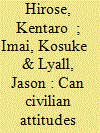

|
|
|
|
|
| Summary/Abstract |
Are civilian attitudes a useful predictor of patterns of violence in civil wars? A prominent debate has emerged among scholars and practitioners about the importance of winning civilian ‘hearts and minds’ for influencing their wartime behavior. We argue that such efforts may have a dark side: insurgents can use pro-counterinsurgent attitudes as cues to select their targets and tactics. We conduct an original survey experiment in 204 Afghan villages and establish a positive association between pro-International Security Assistance Force attitudes and future Taliban attacks. We extend our analysis to 14,606 non-surveyed villages and demonstrate that our measure of civilian attitudes improves out-of-sample predictive performance by 20–30% over a standard forecasting model. The results are especially strong for Taliban attacks with improvised explosive devices. These improvements in predictive power remain even after adjusting for possible confounders, including past violence, military bases, and development aid.
|
|
|
|
|
|
|
|
|
|
|
|
|
|
|
|
| 4 |
ID:
168282
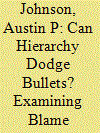

|
|
|
|
|
| Summary/Abstract |
The increased outsourcing of national security endeavors to private military companies (PMCs) raises questions concerning public evaluations of their performance and the extent to which government officials are held accountable. We use a survey experiment to test public blame attribution associated with a failed military operation that was conducted by either regular or private military personnel. Our findings suggest that there are multiple mediating pathways in the process of attributing blame in foreign policy. Furthermore, our findings suggest that contracting out military functions to a PMC can damage perceptions of performance, perhaps increasing blame attribution by the public. These impacts on the attribution of blame suggest that PMCs are viewed as inferior service providers by the mass public and politicians will be held accountable, directly or indirectly. Implications from our study add to the discussion on the outsourcing of military capacities which are rapidly expanding in the Western world.
|
|
|
|
|
|
|
|
|
|
|
|
|
|
|
|
| 5 |
ID:
189007
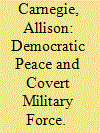

|
|
|
|
|
| Summary/Abstract |
How should we reconcile covert war with normative theories of the democratic peace? Proponents argue that these interventions are consistent with democratic peace theory, as leaders intervene covertly to escape backlash by a public that has internalized liberal norms. Yet we know little about public opinion regarding the covert use of force. Using a survey experiment, we find that respondents are more favorable towards covert interventions against democratic targets than our theories assume, and that even citizens who value transparency the most still wrestle with a trade-off between their normative commitments and the instrumental benefits they perceive covert actions to hold. Our results thus help to explain why American leaders have repeatedly chosen to conduct covert military operations against fellow democracies, and raise important questions about the scope conditions of normative theories of the democratic peace.
|
|
|
|
|
|
|
|
|
|
|
|
|
|
|
|
| 6 |
ID:
166146
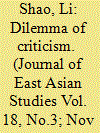

|
|
|
|
|
| Summary/Abstract |
Recent literature claims that China censors information that has the potential to ignite collective action. This article extends this finding by arguing that Chinese censors respond differently to political challenges than they do to performance challenges. Political challenges call into questioning the Party's leading role, whereas performance challenges are directed at the failures of public goods provisions. A survey experiment of about 60 media professionals finds that censors are inclined to block political challenges and to tolerate criticism of the government's performance. However, when criticism contains both performance and political challenges, censorship is far more likely. By exploring the range of censorship activities, the results suggest that the Chinese regime's reliance on popular support constrains its censorship decisions.
|
|
|
|
|
|
|
|
|
|
|
|
|
|
|
|
| 7 |
ID:
175927


|
|
|
|
|
| Summary/Abstract |
A key obstacle to nuclear energy as a decarbonization policy is the public perception of risks of radiation leaks from reactors. In particular, the “not-in-my-backyard (NIMBY)" syndrome suggests that individuals oppose nuclear reactors in their neighborhoods because they overestimate their risks. Arguably, such perceptions would be acute for those who have lived in the vicinity of a nuclear accident. We conducted a surveyembedded experiment in Japan (N = 2574) to assess how the NIMBY syndrome influences public support for restarting nuclear reactors when health, economic, and climate change benefits of nuclear energy are highlighted. We focus on Japan because the risks of nuclear energy became salient after the 2011 Fukushima accident. We test for two types of NIMBY effect, (1) respondents' proximity to any nuclear power plant and (2) respondents' place of residence in 2011 and its proximity to Fukushima. We do not find support for either the NIMBY syndrome or the Fukushima effect. On the contrary, we find support for a “reverse-NIMBY” among low-income residents, when they are treated with information on nuclear energy's low local air pollution (health). Our findings suggest that support for nuclear energy varies across population groups and depends on how its local benefits and costs are framed.
|
|
|
|
|
|
|
|
|
|
|
|
|
|
|
|
| 8 |
ID:
171782
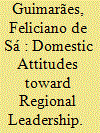

|
|
|
|
|
| Summary/Abstract |
In this paper, we analyze citizens’ attitudes toward regional leadership, employing two sets of survey experiments. Using Brazil as a case study, we analyze the first set of experiments with two types of regional leadership—structural and institutional—across three different regional issues—economic integration, regime change, and regional conflict. We found that Brazilians do not support either type of leadership, whether in regional conflict or in regime change issues, but support institutional leadership in economic integration scenarios. In the second set, we included specific South American countries both in regional conflict and in regime change scenarios. We found that Brazilians prefer Brazil to stay away from acting as a leader once neighboring countries are named in the experiment. Our findings indicate that the literature on regional leadership should incorporate the level of domestic support to understand its implications to the exercise of regional leadership. We embedded our experiments within the project “The Americas and the World: Public Opinion and International Politics, 2014–2015.” We used a nationally representative sample of eighteen hundred respondents undertaken in 2014.
|
|
|
|
|
|
|
|
|
|
|
|
|
|
|
|
| 9 |
ID:
187392


|
|
|
|
|
| Summary/Abstract |
Do citizens care about due process rights when holding insurgent groups accountable for violence? We examine public perceptions of justice and fairness in judicial proceedings brought against suspected Islamic State (ISIS) militants and their supporters in Mosul, Iraq. We conducted a survey of Mosul residents and people in ISIS-affiliated displacement camps outside Mosul to evaluate public support for detainee due process rights. Using a trial and punishment survey experiment, we find that Mosul residents, while favoring capital punishment for ISIS involvement, are also sensitive to procedural due process rights of the accused. People with self-reported ISIS affiliations, in contrast, are more concerned with substantive due process, and do not see capital punishment outcomes as fair, regardless of procedural considerations. Although rebel group sympathizers and opponents have clashing perspectives on what constitutes equitable punishment for participation in insurgency, both recognize the importance of due process rights to long-term peace and security.
|
|
|
|
|
|
|
|
|
|
|
|
|
|
|
|
| 10 |
ID:
189005


|
|
|
|
|
| Summary/Abstract |
This article presents findings of an original survey experiment on public attitudes toward nuclear use conducted on a representative sample of Russian citizens. We randomly assigned our participants to experimental treatments with vignettes describing a military conflict between Russia and NATO in the Baltics, where Moscow considered a limited nuclear “escalate-to-deescalate” strike to avert defeat. Our findings show that Russians are significantly more averse to nuclear strikes than to the corresponding use of conventional missiles. The participants disapproved similarly of a demonstrative nuclear explosion in an unpopulated area and of nuclear strikes in a more escalated scenario. We also found associations between the moral values of individuals and strike support corresponding to earlier studies in the United States. Finally, our participants reported similar concerns about both nuclear and conventional strikes, with the worry about civilian casualties and the suffering of victims at the top of the list across experimental treatments.
|
|
|
|
|
|
|
|
|
|
|
|
|
|
|
|
| 11 |
ID:
183570


|
|
|
|
|
| Summary/Abstract |
Energy transition is a fundamental part of the policy response to climate change, but unlike climate change, we know little about the factors that shape public attitudes about it. We address three questions: 1) how supportive are people of energy transition, 2) how do pre-existing ideas – about politics, economics, climate change, and energy – affect public views on energy transition, and 3) how malleable is public opinion about transition? Using the Canadian province of Alberta – a context where oil and gas are politically and economically predominant – we assess these questions with a population-based survey experiment (n = 1591). Results indicate that energy transition is widely popular. Pre-existing values and beliefs about the economy; political identification with the left-right spectrum; worry about climate change; and hope in the future of oil and gas as a predominant industry strongly structure attitudes about transition. We argue that championing the economic benefits of clean energy will not be persuasive with people who continue to have high hopes in the future economic benefits of fossil fuels. Instead, we suggest policy makers focus instead on the economic risks that come from continued reliance on fossil fuels.
|
|
|
|
|
|
|
|
|
|
|
|
|
|
|
|
| 12 |
ID:
185191
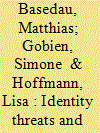

|
|
|
|
|
| Summary/Abstract |
Religion has become increasingly contentious in recent years. Faith-based discrimination, hostility and violence seem to have increased worldwide. But how can faith lead to conflict? In this article, we test the impact of two important dimensions of religion that have been neglected in previous research: the belief in ‘one true religion’ and perceptions of threats by other religious groups. Putting these two potential drivers to the test, we conducted a representative survey experiment with 972 respondents in Dar es Salaam, Tanzania. Results show that one of the tested dimensions, perceptions of threats by others, increases the support to use violence to defend one’s own group. This is particularly the case for religiously intolerant respondents with characteristics such as pre-existing threat perceptions, unfavorable views on intermarriage, or belief in the superiority of their own faith. In contrast, we find relatively weak evidence that the prime of ‘one true religion’ increases the readiness to use violence. Our findings have important implications for policy: We conclude that appeals by leaders to threats by others and intolerance toward other faiths can contribute to more conflict. Political and religious leaders should refrain from capitalizing on such notions and should promote tolerance towards other faiths instead.
|
|
|
|
|
|
|
|
|
|
|
|
|
|
|
|
| 13 |
ID:
185556


|
|
|
|
|
| Summary/Abstract |
This paper examines the political-economy of capital controls in China. We argue that the global policy context influences domestic political debates over capital controls, which, in turn, can shape public attitudes toward the subject. Policy entrepreneurs on each side of the capital controls debate can point to capital account policies in other countries as evidence for the desirability of their position. This issue framing strategy, in turn, influences domestic preferences on capital controls. We present qualitative evidence showing that the international policy context features heavily in domestic political debates about capital controls in China. Next, using original survey data, we show that information about other countries’ policy choices influences mass public attitudes about capital controls in China. The evidence indicates that growing global use of capital controls can strengthen public support for this policy. More broadly, these findings suggest that a complete understanding of policy diffusion requires greater attention to the role played by domestic policy entrepreneurs.
|
|
|
|
|
|
|
|
|
|
|
|
|
|
|
|
| 14 |
ID:
168868
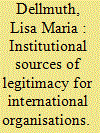

|
|
|
|
|
| Summary/Abstract |
This article addresses a significant gap in the literature on legitimacy in global governance, exploring whether, in what ways, and to what extent institutional qualities of international organisations (IOs) matter for popular legitimacy beliefs towards these bodies. The study assesses the causal significance of procedure and performance as sources of legitimacy, unpacks these dimensions into specific institutional qualities, and offers a comparative analysis across IOs in three issue areas of global governance. Theoretically, the article disaggregates institutional sources of legitimacy to consider democratic, technocratic, and fair qualities of procedure and performance. Empirically, it examines the effects of these institutional qualities through a population-based survey experiment in four countries in different world regions with respect to IOs in economic, security, and climate governance. The findings demonstrate that both procedure- and performance-related aspects of IO policymaking matter for popular legitimacy beliefs. This result holds across democratic, technocratic, and fair qualities of IO procedure and performance. Disaggregating the results by issue area indicates that a broader scope of institutional qualities are important for legitimacy beliefs in economic governance compared to security governance and, especially, climate governance. These findings suggest that propositions to reduce the institutional sources of IO legitimacy to single specific qualities would be misguided.
|
|
|
|
|
|
|
|
|
|
|
|
|
|
|
|
| 15 |
ID:
179560
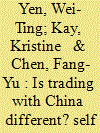

|
|
|
|
|
| Summary/Abstract |
Despite increasing economic integrations with China, worries exist in China's neighboring countries about China's implicit political intention. Do people view trading with China differently? In this article, we incorporate the political context of trade agreements by showing that trade with partners who come with political costs is less likely to be supported. Using a nationally representative survey experiment from Taiwan, we find that trading with China garners less support than trading with Japan or Malaysia, and nationalism suppresses self-interest when the proposed trading partner is China. We show that national attachment, which is neither a proxy for political identification nor a proxy for national chauvinism, becomes a stronger predictor of trade preferences toward China. While the political tension between China and Taiwan is unique, many countries see at least one other country posing a negative externality. Our finding suggests strongly identified nationalists would oppose engaging with a hostile outsider regardless of their self-interest.
|
|
|
|
|
|
|
|
|
|
|
|
|
|
|
|
| 16 |
ID:
192871
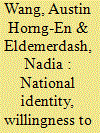

|
|
|
|
|
| Summary/Abstract |
Why do people risk their lives fighting in wars? This article looks beyond group grievance and material benefits to add another psychological mechanism explaining why people choose to fight or not to fight – perceived collective action. An individual is much more likely to fight when they perceive that others will also fight. Contrary to the expectations of social identity theory and social pressure theory, the effect of perceived collective action is stronger among those who have a weaker national identity because they are more likely to rationally calculate the chance of winning by accounting for others’ decisions. To mitigate the endogeneity in post-conflict cross-sectional surveys, we conduct a survey experiment (n = 1,001) in Taiwan manipulating perceptions of others’ willingness to fight in a potential China–Taiwan military conflict. Experimental evidence supports the hypotheses that perceived collective action works only on weak Taiwanese identifiers. The result holds in robustness checks and in another nationally representative survey.
|
|
|
|
|
|
|
|
|
|
|
|
|
|
|
|
| 17 |
ID:
193104
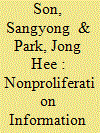

|
|
|
|
|
| Summary/Abstract |
What explains the foreign policy gap between elites and the general public on nuclear proliferation? We investigate specific contexts in which experts’ nonproliferation information changes public attitudes toward nuclear weapons development using a novel attitude change experiment. By randomly assigning seven categories of nonproliferation information to pro-armament survey participants, we examine how different types of nonproliferation information affect pro-armament respondents’ opinions and behavioral choices. The results of our experiment demonstrate the enlightening effect of economic sanctions information. After learning about the economic costs and consequences of nuclear weapons development, pro-armament respondents substantially changed their opinion as well as behaviors toward nuclear proliferation. In comparison to economic sanctions information, other types of nonproliferation information (e.g. conditional military punishment, normative sanctions, nuclear technology sanctions, elite or public opposition to proliferation) have limited effects on pro-armament subjects’ attitude changes. These findings are the first to identify the relative explanatory powers of previous explanations for nuclear nonproliferation at the individual level.
|
|
|
|
|
|
|
|
|
|
|
|
|
|
|
|
| 18 |
ID:
191009
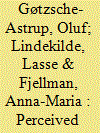

|
|
|
|
|
| Summary/Abstract |
Approaches to countering violent extremism (CVE) increasingly call upon ordinary citizens to report concerns regarding radicalization to authorities. However, knowledge about the factors determining their willingness to report remains limited. This paper addresses this void by asking under what circumstances members of the public are willing to report concerns of radicalization to authorities. The paper reports findings from a large-scale, comparative survey experiment fielded to nationally representative samples in Sweden, Denmark, Norway and Finland (n = 7,389) as well as eight city representative samples (two in each country, n = 6,603). We investigate how perceptions of the appropriateness, inclusiveness, implementation and outcome of CVE policies combine in forming perceptions of the legitimacy of CVE policy, and how manipulations of perceived legitimacy shape willingness to collaborate with authorities. Both cross-country and cross-city differences in willingness to report concerns of radicalization are explored. The results show that the more legitimate citizens perceive CVE policies to be, the more willing they are to contact authorities to report concerns of radicalization, while perceptions of CVE policies as illegitimate lead to a preference for reactions involving “intimates” of the individual in question and short of reporting to authorities. The implications of the findings for CVE practices are discussed.
|
|
|
|
|
|
|
|
|
|
|
|
|
|
|
|
| 19 |
ID:
187856
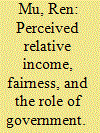

|
|
|
|
|
| Summary/Abstract |
Previous studies have shown that Chinese citizens generally are optimistic about their economic opportunities and tolerant of the high levels of inequality in their society. This paper conducts a random survey experiment to examine whether the established views on fairness and inequality change after the respondents receive the general information on wealth concentration or the customized information on their household income ranking. We find that both types of information lead respondents to view society as less fair than they had initially believed. The information on the wealth concentration also increases public concern about social inequality. Nevertheless, neither information offered to the respondents make them think that government should play a more significant role in reducing inequality. This lack of demand for government intervention may be partially explained by a lower level of trust in the local government induced by the two information treatments.
|
|
|
|
|
|
|
|
|
|
|
|
|
|
|
|
| 20 |
ID:
142574
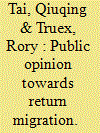

|
|
|
|
|
| Summary/Abstract |
China has adopted preferential measures in hopes of luring back overseas talent, but what determines individual attitudes towards returning migrants and policies promoting return migration? This paper addresses this question using an original survey experiment of Chinese netizens. We argue that attitudes towards return migration are driven by two competing perceptions: on one hand, skilled migrants are widely thought to have beneficial effects on the local economy; on the other, domestic citizens may be wary of policies that offer elite returnees excessive benefits. The findings imply that the CCP may face a delicate trade-off between the economic benefits of return migration and the social costs of increasing inequality.
|
|
|
|
|
|
|
|
|
|
|
|
|
|
|
|
|
|
|
|
|